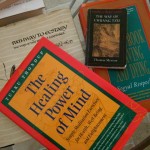So Chuck and I have lately been writing about mindfulness meditation with the goal of achieving compassion, for ourselves and others. We both spent some nights dreaming with the Dalai Lama, thought to be the incarnation of the Buddha of Compassion, and indeed his life has centered on bringing the concept of compassion to the modern world. But what about mindfulness, what is it and how does one achieve it?

I like to think of mindfulness as a practice of achieving a peaceful mind, the true nature of mind. By constantly reminding myself that my life is a journey, and by acknowledging that everything that happens in a day and in a lifetime is an important part of my learning experience, I am able to bring myself closer and closer to achieving the goal of peaceful mind. Sometimes I get there for long periods of time, and other times I may only touch down for a few minutes a day, but the more I remind myself of my goal the easier it becomes to quickly experience peacefulness of mind.
Even during recapitulation, when in the throes of a memory, one can use the practice of mindfulness to ground the self and stay in the adult present self. Reiterating often that life is a journey of self-discovery helps anchor one in reality, even while another part may be experiencing something from a painful past. Mindfulness is that anchor, the anchor of awareness that we are all on journeys, that we are all in our lives to learn something, that we are all sentient beings capable of incredible feats. The first incredible feat is to remember these things, to change how we think about ourselves and our lives by constantly bringing our attention back to these truths. The second incredible feat is learning to let go of what normally fills our minds so that we can rest a moment in the peacefulness of empty mind. Mindfulness is building awareness of ourselves beyond the usual cogitations of the mind, awareness that the perfect state of mind is peaceful. It is what our minds seek most of all.
It is possible to begin training in mindfulness simply by bringing attention to what we are doing throughout the day, staying mindful of the moment. In such mindfulness practice peace exists. Now I am mindful that I am sitting at my computer and writing, but I am also mindfully aware of my breath, of my calm heart, of words flowing out of me.

In a little while I will make a cup of tea. I will sit calmly with my tea and drink it mindfully, focusing on its nourishment, letting thoughts go as I remind myself that “I am drinking tea, I am drinking tea.” When I take a walk, I remind myself that “I am walking now, I am walking.” I focus on my breathing and my next step, letting thoughts go. As thoughts return, as they always will, I simply bring my attention back to what I am doing. “Oh, yes, I am walking!” When I go to yoga class I calm my mind by saying, “I am in yoga class now, I am present in my body in yoga class.” I constantly remind myself to come back to the moment, to where I am and what I am doing in the moment. In so doing, I allow all else to escape the confines of my mind, leaving room for a few moments of empty, peaceful mind.
This mindfulness practice of constantly re-anchoring in the moment, aids in allowing worry and stress to be absent, however briefly. Given a reprieve it will often leave of its own accord, for in reality it does not exist if we do not give it a home to exist in.
Begin the process of mindfulness meditation in everyday life simply by being in the moment and then re-focusing on being in the moment. It doesn’t need to be something that we sit and do at a certain time each day, though that is perfectly acceptable too. In the end, by simply allowing it to become a natural part of everyday life, it grants us its gifts more frequently. By constantly reminding ourselves to be mindfully aware, we train our awareness to be mindful more often and pretty soon we find that it comes to our rescue when we most need it, such as in a moment of intense recapitulation as I mentioned.
Being able to anchor ourselves in the awareness of now, reminding ourselves of the truths of our journeys upon this earth and the desires of our spirits to learn and grow, helps greatly as we face our recapitulations. The more we are mindful, the easier it becomes to be mindful again and again. One day we might notice just how peaceful our minds are and, however brief the moment may be, take it as a sign of achieving the goal of mindfulness.

With mindfulness comes compassion; it just naturally seems to lead the way there. We find that compassion does not really need any explanation. One day we just find ourselves experiencing it because we have already taken on the biggest enemy of compassion: the old mind with all of its directives, judgments, condemnations, repetitive voices and tiresome criticisms. By letting it go we become open to new ideas, new thoughts, and incredible feats of mind never before thought possible. One day we find that all of our thoughts are compassionate ones, all of our ideas embrace a new paradigm, encompassing a broader worldview where everyone is equal.
By opening the mind to peacefulness we allow new energy in, and it comes in calmly, aware that something is different now, that the mind is no longer accepting the old way, for it is only interested in peaceful emptiness for all.
Peace,
Jan











